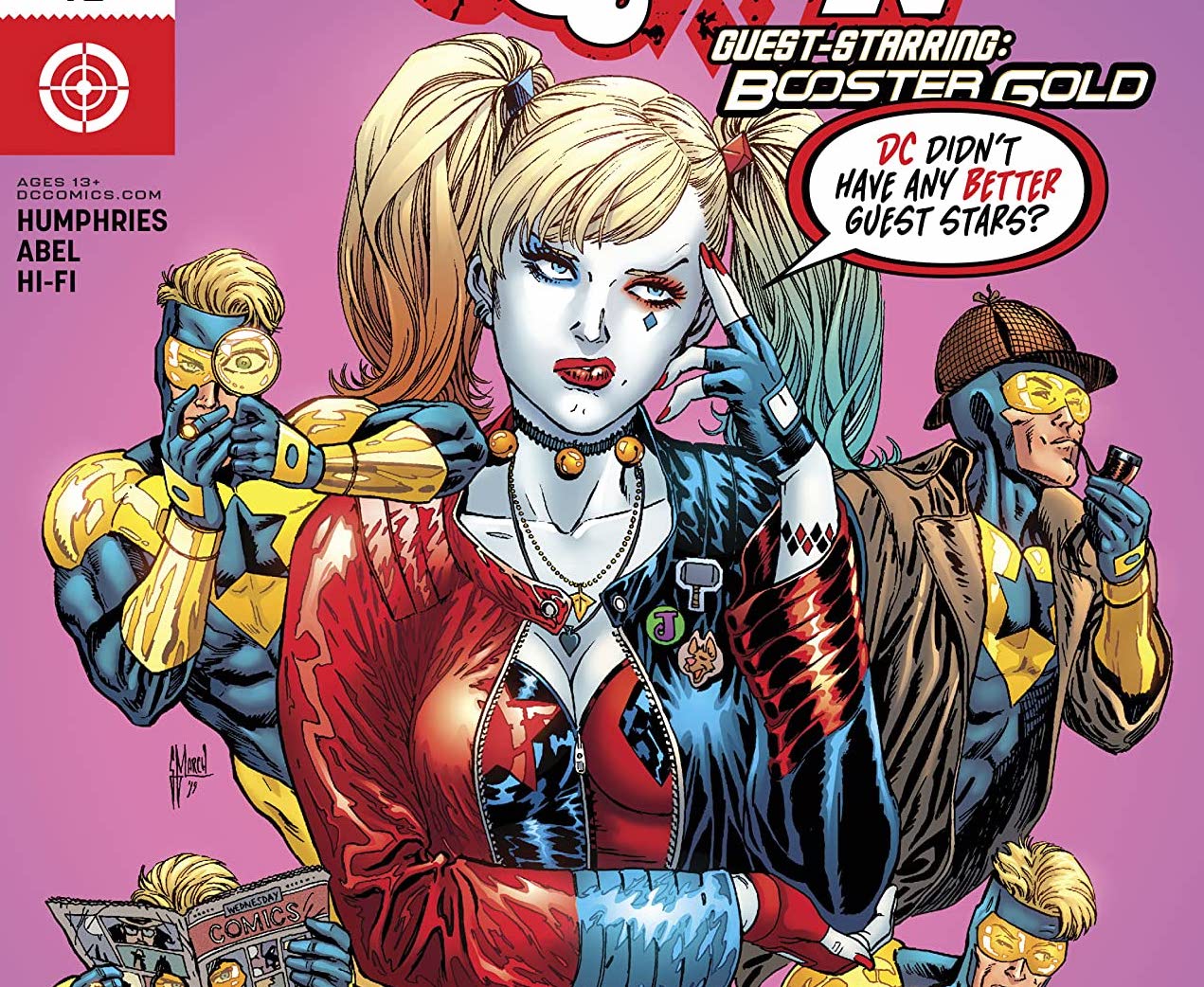Armed with nothing more than her fists, brand-new butt-kicking boots, and a Ph.D., Harley Quinn has powerslammed her way through hordes of Nazis and superpowered wrestlers in the pursuit of Alicia’s murderer. Unfortunately, this violent strategy has put a chokehold on her investigation, as Harley’s number one, baby-faced suspect is now in the wind.
Even Alicia’s daughter is beginning to doubt Harley’s theory because the only physical evidence to implicate the wrestling ringleader is adult diaper receipts. Thankfully, Booster Gold has her back. With one lead left to follow, Harley and her new sidekick will have to trust that rumbling feeling in her gut.
“And my gut is hungry. For vengeance.”
Harley Quinn #72 is a comic book masquerading as a standard murder mystery. However, underneath its trench coat and sunglasses disguise lies an excellent character study centered on grief. Although Humphries has undoubtedly crafted an entertaining mystery, this issue’s true strength is in its exploration of Harley as she continues to deal with the loss of Alicia and, more importantly, her mother. However, none of this would be nearly as effective without Humphries’ humor woven throughout the story to provide levity to these serious themes.
One of the things that I have loved about this story arc is Humphries’ use of recurring themes. Harley Quinn’s question to Booster Gold, “where do ya think we go when we die?” is a direct call back to the first issue of this story arc. In Harley Quinn #70, we find our aspiring wrestler beaten and bloody in the back of an ambulance, asking this same question to the reader. Although this should have given me some insight into her mindset at the onset, it was not until Booster spells things out at the issue’s end that the pieces fit together for me.
Before Harley can set off to confront the next suspect in Alicia’s murder, Booster stops her, saying, “it’s like you have a death wish.” Engaging in self-destructive behavior is one of the unhealthy ways that someone can express unresolved grief. Whether it is Harley’s increased alcohol consumption, her reluctance to tag out during a beating in the ring, or her willingness to take a bullet from a cultist, Harley’s behavior appears to support this assertion.

Harley Quinn #72
Booster’s statement stuck with me so much that I went back to re-read the prior issues to see what I might have missed. It was during this re-reading that I discovered a line of narration regarding the notion that Harley is seeking out punishment for her mother’s death. The narrator states, “maybe she’s dreaming of something more. Oblivion.” Booster’s belief that Harley has a death wish in this issue is a direct callback to a line that I had forgotten about from my first reading. This level of detail elevates the story.
Harley’s denial of these fatal wishes, as well as her self-proclaimed ability to diagnose herself, adds a level of realism to this personal conflict. When we are in the midst of a personal struggle, it is often difficult to see how our actions might be harmful to ourselves or others. Harley’s reaction adds a level of relatability to her character as she grieves the loss of both her friend and her mother.
“Uh, are we still doing the bit?”
The chemistry between Harley Quinn and Booster is a major selling point, as it is a source of humor for much of the issue. The sequence where the duo infiltrates the cult is one of my favorite moments in the book. Each character’s ability to one-up the other to make the cultists feel so uncomfortable that they stop their recruitment speech is ridiculously funny.
Additionally, I think this sequence serves two purposes. The first is that it serves as a reminder that Booster promised he would be able to keep up with Harley. I think it also shows us that Harley is not necessarily at the top of her game. Although much of Harley’s dialogue is funny, Booster tops her with sheer ridiculousness, as evidenced by Harley shooting whiskey out of her nose.
“We, uh… this ain’t the bathroom?!”
The only gripe that I have with Harley Quinn #72 is the artwork. Abel’s style is similar enough to Sami Basri’s that the change in artists is not jarring. Additionally, Abel does a great job illustrating the action for each sequence. I especially like the panels where Booster catches Harley, and she begins to ride him like a horse.
Unfortunately, sometimes the facial work for characters like Booster Gold feels off. There were a few instances where it took me out of the story, but only momentarily. Overall, Abel does a great job conveying Harley’s exaggerated emotions.
Behind its murder mystery facade, Harley Quinn #72 is an excellent character study centered on grief. Humphries’ use of recurring themes provides a level of realism to the story that makes it easy to empathize with Harley’s struggle. Additionally, the humorous chemistry between Harley and Booster provides the necessary levity for this issue. Although some of Booster’s facial expressions feel off, Abel’s artwork does a good job conveying the action as well as Harley’s exaggerated emotions.
Join the AIPT Patreon
Want to take our relationship to the next level? Become a patron today to gain access to exclusive perks, such as:
- ❌ Remove all ads on the website
- 💬 Join our Discord community, where we chat about the latest news and releases from everything we cover on AIPT
- 📗 Access to our monthly book club
- 📦 Get a physical trade paperback shipped to you every month
- 💥 And more!














You must be logged in to post a comment.